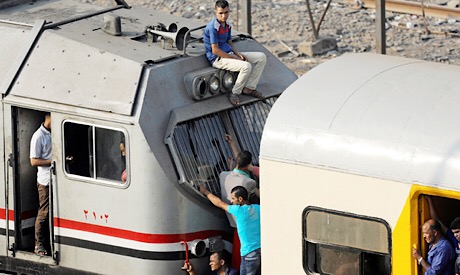
File Photo: People travel on an overcrowded train in Cairo, Egypt on August 12, 2017 (Reuters)
Egypt's ministries of transport and planning, along with the World Bank, are working out a strategy to upgrade Egypt's railway network which is in dire need of comprehensive renovation.
Deputy Minister of Transport Amr Shaath and advisor to the Minister of Planning Ahmed Kamali held a meeting with representatives of the World Bank and an Egyptian-Italian consortium earlier this week during which they outlined a strategy to reform the country's railway sector.
Kamali, who is also a professor of economics at the American University in Cairo, underlined the importance of implementing reforms in the transport sector, especially the railway network, to halt the deterioration witnessed over previous years and the poor standard of service provided.
Improvement of the railways will involve infrastructure, maintenance and technological development as well as the security and safety of passengers and services provided to citizens, Kamali said.
According to Shaath, the authority has signed a contract with an Egyptian-Italian consortium to offer advisory services.
This will help in defining a strategy to reform the country's railways sector, while taking into consideration recommendations by the World Bank regarding the necessity of restructuring the financial and legal frameworks of the authority.
Improving railways in Egypt should have started 45 years ago but began only three years ago, Shaath said, stressing the role of the private sector in advancing railways in Egypt.
Kamali said the ministry is already adopting the public-private partnership (PPP) formula to finance development projects.
“The private sector plays an essential role in the proposed reform process, as the efficiency of services provided can be achieved through the presence of a number of transport providers from private companies," the minister's advisor said.
He stressed the importance of clarifying the government's return on investments for reforming the transport sector so as to obtain government support.
The draft strategy started by assessing the current status of the Railway Authority for operating costs, structure of debt and the current status of assets, investment and consumables.
Hussein Khater, a member of parliament's Transport Committee, said the Railway Authority’s debt had reached LE40 billion.
The losses, according to Khater, are due to the low price of tickets because the government has been subsidising ticket prices except for first class and VIP trains.
According to a report issued by Central Agency for Public Mobilisation and Statistics (CAPMAS) issued in 2017, the number of train accidents between 2004 and 2016 was 13,539. Egypt recorded its highest number of train accidents in 2009, with 1,577.
For more than a decade, there have been several calls for greater investment to improve Egypt’s national railway network which has a total length of 9,570 kilometres.
Experts stressed the importance of investing in the signaling system, level-crossings, tracks and more.
Khater said mechanisation could be one solution to preventing accidents, and that depending on the manual operation of railways must be abolished.
He also expressed his support for the idea of hiring a private company to manage the Railway Authority.
*A version of this article appears in print in the 21 February, 2019 edition of Al-Ahram Weekly under the headline: Railway reform on track
Short link: